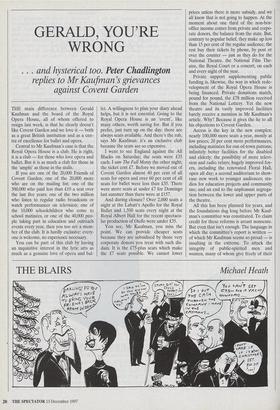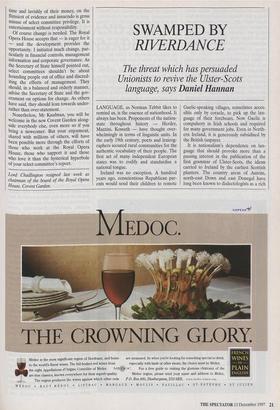GERALD, YOU'RE WRONG
. . . and hysterical too. Peter Chadlington
replies to Mr Kaufman 's grievances against Covent Garden
THE main difference between Gerald Kaufman and the board of the Royal Opera House, all of whom offered to resign last week, is that he clearly doesn't like Covent Garden and we love it — both as a great British institution and as a cen- tre of excellence for ballet and opera.
Central to Mr Kaufman's case is that the Royal Opera House is a club. He is right, it is a club — for those who love opera and ballet. But it is as much a club for those in the `amphi' as those in the stalls.
If you are one of the 20,000 Friends of Covent Garden; one of the 20,000 more who are on the mailing list; one of the 500,000 who paid less than £10 a seat over the last five years; one of the two million who listen to regular radio broadcasts or watch performances on television; one of the 10,000 schoolchildren who come to school matinees, or one of the 40,000 peo- ple taking part in education and outreach events every year, then you too are a mem- ber of the club. It is hardly exclusive: every- one is welcome, no experience necessary.
You can be part of this club by having an inquisitive interest in the lyric arts as much as a genuine love of opera and bal- let. A willingness to plan your diary ahead helps, but it is not essential. Going to the Royal Opera House is an 'event', like many others, worth saving for. But if you prefer, just turn up on the day; there are always seats available. And there's the rub, says Mr Kaufman: it's an exclusive club because the seats are so expensive.
I went to see England against the All Blacks on Saturday; the seats were £35 each. I saw The Full Monty the other night; the ticket cost £7. Before we moved out of Covent Garden almost 40 per cent of all seats for opera and over 60 per cent of all seats for ballet were less than £35. There were more seats at under £7 for Domingo last summer than there were at £157.
And during closure? Over 2,000 seats a night at the Labatt's Apollo for the Royal Ballet and 1,500 seats every night at the Royal Albert Hall for the recent spectacu- lar production of Otello were under £35.
You see, Mr Kaufman, you miss the point. We can provide cheaper seats because they are subsidised by those very corporate donors you treat with such dis- dain. It is the £75-plus seats which make the £7 seats possible. We cannot lower prices unless there is more subsidy, and we all know that is not going to happen. At the moment about one third of the non-box- office income comes from private and corpo- rate donors, the balance from the state. But, contrary to popular belief, they make up less than 15 per cent of the regular audience; the rest buy their tickets by phone, by post or over the counter — just as they do for the National Theatre, the National Film The- atre, the Royal Court or a concert, on each and every night of the year.
Private support supplementing public funding is, likewise, the way in which rede- velopment of the Royal Opera House is being financed. Private donations match, pound for pound, the £78 million received from the National Lottery. Yet the new theatre and its vastly improved facilities barely receive a mention in Mr ICaufman's article. Why? Because it gives the lie to all his objections to Covent Garden.
Access is the key in the new complex: nearly 100,000 more seats a year, mostly at low prices; 20 per cent more performances, including matinees for out-of-town patrons; infinitely better facilities for the disabled and elderly; the possibility of more televi- sion and radio relays; hugely improved foy- ers, including the renovated Floral Hall, open all day; a second auditorium to show- case new work to younger audiences; stu- dios for education projects and community use; and an end to the unpleasant segrega- tion between the lower and upper parts of the theatre.
All this has been planned for years, and the foundations dug long before Mr Kauf- man's committee was constituted. To claim credit for these reforms is arrant nonsense. But even that isn't enough. The language in which the committee's report is written — of which Mr Kaufman seems so proud — is insulting in the extreme. To attack the integrity of public-spirited men and women, many of whom give freely of their time and lavishly of their money, on the flimsiest of evidence and innuendo is gross misuse of select committee privilege. It is entertainment without responsibility.
Of course change is needed. The Royal Opera House accepts that — is eager for it — and the development provides the Opportunity. I initiated much change, par- ticularly in financial controls, management Information and corporate governance. As the Secretary of State himself pointed out, select committees shouldn't be about hounding people out of office and discred- iting the efforts of management. They should, in a balanced and orderly manner, advise the Secretary of State and the gov- ernment on options for change. As others have said, they should lean towards under- rather than over-statement.
Nonetheless, Mr Kaufman, you will be welcome in the new Covent Garden along- side everybody else, even more so if you bring a newcomer. But your enjoyment, shared with millions of others, will have been possible more through the efforts of those who work at the Royal Opera House, those who support it and those Who love it than the hysterical hyperbole of your select committee's report.
Lord Chadlington resigned last week as chairman of the board of the Royal Opera House, Covent Garden.



















































































 Previous page
Previous page